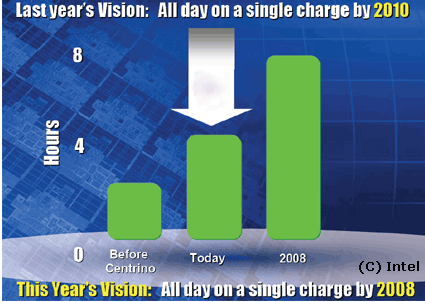Squeezing More Life Out of Your Notebook's Battery Part I
OEM spin aside, notebook battery lives just are not up to what consumers and business want. Industry group Mobile PC EBLWG says laptops that run eight hours on a charge will be available by 2008. But how do they expect to pull the feat off and what can you do in the meantime to squeeze more life out of your notebook's battery? Keywords
The Eight-Hour Battery Life Notebook

According to Intel, eight-hour notebook battery lives are less than two years away.
Increased mobility is what sets a notebook apart from its desktop PC counterpart, but unfortunately, a laptop is only as good as its battery charge unless it is tethered by a cord plugged into a socket. A notebook's worth and performance thus largely hinge on how well its components can make use of power. Users also expect their notebook's performance to be on par with a desktop PC, while more PC computing power inevitably translates into a greater drain on the battery.
A Joint Industry Vision
The pursuit of better notebook performance while extending battery life is a big part of what the Mobile PC Extended Battery Life Working Group's mission is about. One of the Mobile PC EBL's main goals is the eventual design of a notebook with an all-day battery life.
Mobile PC EBLWG traces its origins back to Intel's "Battery Life Initiative," begun in early 2002. While it was Intel's hope to convince notebook component and subsystem builders that the company's vision of an eight-hour notebook batter life had merit, Mobile PC EBLWG represents an industry consortium as opposed to a single company's initiative. Leading system, subsystem and component vendors work together to transform the vision of a notebook with an eight-hour battery life into reality by 2008. The Members Page reads like a "Who's Who" among the notebook elite. There, you'll find AMD and Intel, system vendors such as Compal and Wistron alongside both of the major graphics processor makers ATI and NVIDIA, memory makers Infineon and Samsung and display and notebook OEMs Dell, HP and Lenovo IBM. Naturally, software vendors like Microsoft and battery manufacturers, as well as fuel cell makers, are also involved. The participants jointly develop standards and technologies to ensure that building blocks, materials, components and even software make the most efficient use of stored energy in a notebook PC's battery. In addition, the group is looking into new kinds of energy storage systems (better known as energy delivery systems such as fuel cells) to be developed for installation and use in laptop computers.
Sign up to get the BEST of Tom’s Guide direct to your inbox.
Upgrade your life with a daily dose of the biggest tech news, lifestyle hacks and our curated analysis. Be the first to know about cutting-edge gadgets and the hottest deals.
Current page: Squeezing More Life Out of Your Notebook's Battery Part I
Next Page Battery Life As A Turnover Multiplier For Vendors